巴纳德的经理人员职能
社会系统学派-经理人员的职能
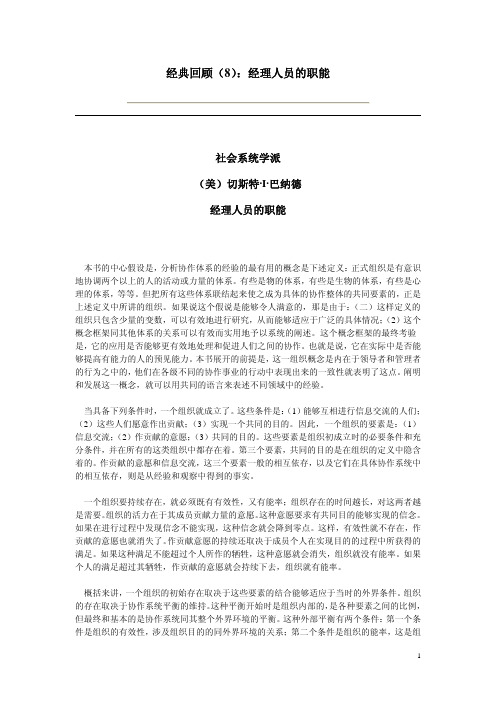
经典回顾(8):经理人员的职能社会系统学派(美)切斯特·I·巴纳德经理人员的职能本书的中心假设是,分析协作体系的经验的最有用的概念是下述定义:正式组织是有意识地协调两个以上的人的活动或力量的体系。
有些是物的体系,有些是生物的体系,有些是心理的体系,等等。
但把所有这些体系联结起来使之成为具体的协作整体的共同要素的,正是上述定义中所讲的组织。
如果说这个假说是能够令人满意的,那是由于:(二)这样定义的组织只包含少量的变数,可以有效地进行研究,从而能够适应于广泛的具体情况;(2)这个概念框架同其他体系的关系可以有效而实用地予以系统的阐述。
这个概念框架的最终考验是,它的应用是否能够更有效地处理和促进人们之间的协作。
也就是说,它在实际中是否能够提高有能力的人的预见能力。
本书展开的前提是,这一组织概念是内在于领导者和管理者的行为之中的,他们在各级不同的协作事业的行动中表现出来的一致性就表明了这点。
阐明和发展这一概念,就可以用共同的语言来表述不同领域中的经验。
当具备下列条件时,一个组织就成立了。
这些条件是:(1)能够互相进行信息交流的人们;(2)这些人们愿意作出贡献;(3)实现一个共同的目的。
因此,一个组织的要素是:(1)信息交流;(2)作贡献的意愿;(3)共同的目的。
这些要素是组织初成立时的必要条件和充分条件,并在所有的这类组织中都存在着。
第三个要素,共同的目的是在组织的定义中隐含着的。
作贡献的意愿和信息交流,这三个要素一般的相互依存,以及它们在具体协作系统中的相互依存,则是从经验和观察中得到的事实。
一个组织要持续存在,就必须既有有效性,又有能率;组织存在的时间越长,对这两者越是需要。
组织的活力在于其成员贡献力量的意愿。
这种意愿要求有共同目的能够实现的信念。
如果在进行过程中发现信念不能实现,这种信念就会降到零点。
这样,有效性就不存在,作贡献的意愿也就消失了。
作贡献意愿的持续还取决于成员个人在实现目的的过程中所获得的满足。
经理人员的职能(ppt 38页)
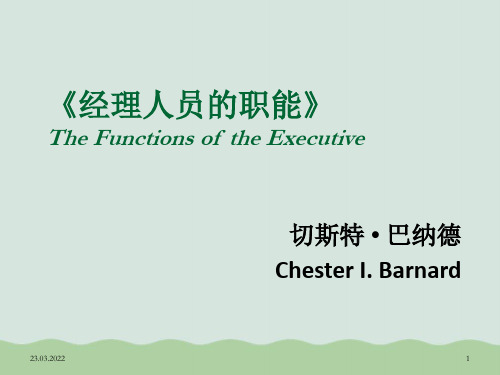
23.03.2022
13
篇章结构
第三篇 正式组织的要素
第十章 专门化的基础和种类 第十一章 诱因的经济 第十二章 有关权威的理论 第十三章 决策的环境 第十四章 随机应变主义的理论
23.03.2022
14
核心要义
《经理人员的职能》一书将社会学概念应用于 分析经理人员的职能和工作过程,并把研究重 点放在组织结构的逻辑分析上,提出了一套协 作和组织的理论。
第一章 导论 第二章 个人和组织 第三章 协作体系中物的和生物的限制 第四章 协作体系中的心理因素和社会因素 第五章 协作行为的原则
23.03.2022
12
篇章结构
第二篇 正式组织的理论和结构
第六章 正式组织的定义 第七章 正式组织的理论 第八章 复合正式组织的结构 第九章 非正式组织和它们同正式组织的关系
23.03.2022
9
Major Works
《发展经理人员的能力》(1925) 《社会进步中企业利益》(1929) 《为企业服务的大学教育》(1930) 《经理人员的职能》(1938) 《经理人员的教育》(1945 ) 《组织与管理》(1948) 《科学和组织》(1951)
23.03.2022
——赫伯特 • 西蒙
23.03.2022
4
名家点评
它的思想博大精深,一时难以理解; 尽管如此,它仍是一座纪念碑。
——《追求卓越》(T. J. 彼得斯)
23.03.2022
5
作者生平
切斯特•巴纳德 (Chester I. Barnard, 1886-1961)是西方现 代管理理论中社会系统 学派的创始人。
10
著作影响
《经理人员的职能》中开创性研究奠定 了现代组织理论的基础,后来的许多学者 如德鲁克、孔茨、明茨伯格、西蒙等人都 极大地受益于它,并在不同方向上有所发 展。对于经理人员,特别是希望将一个传 统的组织改造为现代组织的经理人员来说, 这本书的价值尤其突出。
经理人员的职能
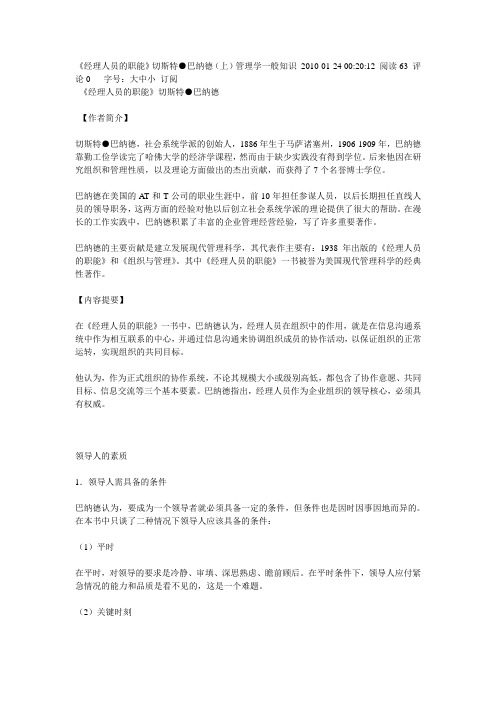
《经理人员的职能》切斯特●巴纳德(上)管理学一般知识2010-01-24 00:20:12 阅读63 评论0 字号:大中小订阅《经理人员的职能》切斯特●巴纳德【作者简介】切斯特●巴纳德,社会系统学派的创始人,1886年生于马萨诸塞州,1906-1909年,巴纳德靠勤工俭学读完了哈佛大学的经济学课程,然而由于缺少实践没有得到学位。
后来他因在研究组织和管理性质,以及理论方面做出的杰出贡献,而获得了7个名誉博士学位。
巴纳德在美国的AT和T公司的职业生涯中,前10年担任参谋人员,以后长期担任直线人员的领导职务,这两方面的经验对他以后创立社会系统学派的理论提供了很大的帮助。
在漫长的工作实践中,巴纳德积累了丰富的企业管理经营经验,写了许多重要著作。
巴纳德的主要贡献是建立发展现代管理科学,其代表作主要有:1938年出版的《经理人员的职能》和《组织与管理》。
其中《经理人员的职能》一书被誉为美国现代管理科学的经典性著作。
【内容提要】在《经理人员的职能》一书中,巴纳德认为,经理人员在组织中的作用,就是在信息沟通系统中作为相互联系的中心,并通过信息沟通来协调组织成员的协作活动,以保证组织的正常运转,实现组织的共同目标。
他认为,作为正式组织的协作系统,不论其规模大小或级别高低,都包含了协作意愿、共同目标、信息交流等三个基本要素。
巴纳德指出,经理人员作为企业组织的领导核心,必须具有权威。
领导人的素质1.领导人需具备的条件巴纳德认为,要成为一个领导者就必须具备一定的条件,但条件也是因时因事因地而异的。
在本书中只谈了二种情况下领导人应该具备的条件:(1)平时在平时,对领导的要求是冷静、审填、深思熟虑、瞻前顾后。
在平时条件下,领导人应付紧急情况的能力和品质是看不见的,这是一个难题。
(2)关键时刻关键时该,也就是紧急关头,指是发生重大危机。
前途未卜、生命存亡之际,情况瞬息万变,要求当机立断。
这不仅要求领导人有极大的勇气,富于独创的精神,甚至还需要厚颜无耻、卑躬屈膝。
《经理人员的职能》读书笔记
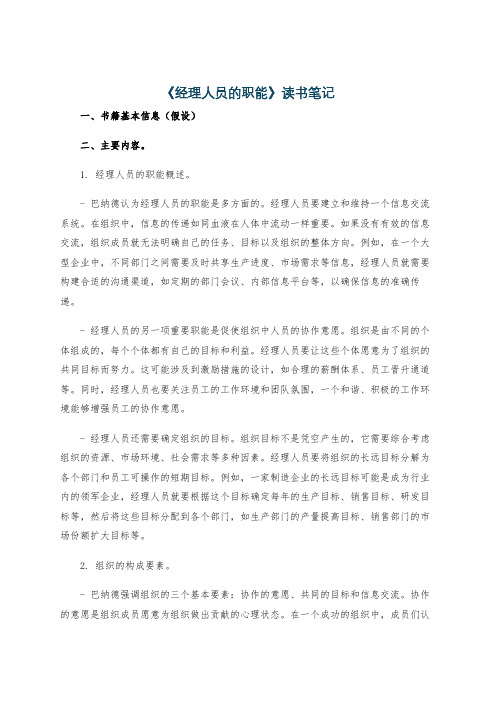
《经理人员的职能》读书笔记一、书籍基本信息(假设)二、主要内容。
1. 经理人员的职能概述。
- 巴纳德认为经理人员的职能是多方面的。
经理人员要建立和维持一个信息交流系统。
在组织中,信息的传递如同血液在人体中流动一样重要。
如果没有有效的信息交流,组织成员就无法明确自己的任务、目标以及组织的整体方向。
例如,在一个大型企业中,不同部门之间需要及时共享生产进度、市场需求等信息,经理人员就需要构建合适的沟通渠道,如定期的部门会议、内部信息平台等,以确保信息的准确传递。
- 经理人员的另一项重要职能是促使组织中人员的协作意愿。
组织是由不同的个体组成的,每个个体都有自己的目标和利益。
经理人员要让这些个体愿意为了组织的共同目标而努力。
这可能涉及到激励措施的设计,如合理的薪酬体系、员工晋升通道等。
同时,经理人员也要关注员工的工作环境和团队氛围,一个和谐、积极的工作环境能够增强员工的协作意愿。
- 经理人员还需要确定组织的目标。
组织目标不是凭空产生的,它需要综合考虑组织的资源、市场环境、社会需求等多种因素。
经理人员要将组织的长远目标分解为各个部门和员工可操作的短期目标。
例如,一家制造企业的长远目标可能是成为行业内的领军企业,经理人员就要根据这个目标确定每年的生产目标、销售目标、研发目标等,然后将这些目标分配到各个部门,如生产部门的产量提高目标、销售部门的市场份额扩大目标等。
2. 组织的构成要素。
- 巴纳德强调组织的三个基本要素:协作的意愿、共同的目标和信息交流。
协作的意愿是组织成员愿意为组织做出贡献的心理状态。
在一个成功的组织中,成员们认识到自己的利益与组织的利益是相关联的,从而愿意积极协作。
例如,在一个项目团队中,成员们为了完成项目任务,愿意加班加点、分享自己的专业知识和经验。
- 共同的目标是组织存在的基础。
这个目标要被组织成员所理解和接受。
如果组织目标模糊不清或者成员对目标缺乏认同感,组织就会陷入混乱。
一家非营利组织致力于环保事业,其成员都明确这个共同的环保目标,并且朝着减少污染、推广环保理念等具体目标努力。
巴纳德论经理人员的职能(Barnard on the functions of managers)

巴纳德论经理人员的职能(Barnard on the functions of managers)The function of a manager is related to all the work necessary to the organization's vitality and continuity, at least when the organization must pass formal coordination operations. The function of a manager is to maintain a system of collaborative effort. The function of the manager is impersonal. The functions of the managers we speak of are like the rest of the body, including the brain. The nervous system directs the activities of the body so that the body can adapt to the environment more effectively and survive.- BarnardThe organization is a huge collaboration system with a team of willing people with certain purposes and communication with each other as the main communication channel. Information exchange plays an important central role in the development of an organization. It must have a person in the central position of the communication system to coordinate and control the normal operation of the whole system. The man in the center is the manager of Barnard. The function of the manager will be related to the organization's vitality and all the work necessary for continuity, at least when the organization must pass formal coordination operations. But it is not all work and organization are the management work only to maintain the organization and operation of specialized work to belong to this category, so all the work is not the managers with management functions that other people by coordinating activities. As Barnard said, the general manager of a company to sell goods, the president of a university directly to the students and other similar work is not belonging to theorganization of the management work, he was just in the performance of a universal organization member functions, but these may than the specialized management work more value. In fact, the manager's job is a mixture of management and non management, the function of the executive is to maintain a large and complex system of collaborative efforts, he is not in the management of a group of people, but in the coordination and command of a series of activities of the organization. He is not an independent individual, whose activities are impersonal and dependent on the activities of the entire organization and other members of the organization, as well as the whole organization's activities, which are closely related, interrelated and mutually influenced. Therefore, Barnard's basic functions of managers correspond to the elements of the organization, that is, the willingness to collaborate, the purpose of collaboration, and the exchange of information. The manager's functions are as follows: (1) to provide a system for information exchange; to promote necessary personal efforts; and to formulate and formulate goals.I. maintaining the organization's information exchange systemAn organization, especially a composite organization, must have an information exchange centre and corresponding managers. The managers are in the key position of the information communication center, and their tasks are very heavy. He begins by setting up posts in the organization's information exchange system, and then configuring the right people for each job. These two tasks are, in fact, two complementary aspects of the same thing.Tissue structureOrganization structure actually refers to the determination of the position of an organization, each position has its corresponding responsibilities, which are often expressed in the form of organization charts, job descriptions, and division of labor. It includes the coordination work, namely the objective decomposition for auxiliary purposes, specialization, task and so on; can obtain the type and quantity of service personnel; cooperation system in order to realize the type and quantity required for the purpose of personnel; necessary incentives; these factors can be combined with location and time etc.. In fact, these factors influence each other, and they all belong to the category of functional managers, Barnard studied separately in the organizational structure, always assume these factors are the strategic factors, other factors are the same, but the purpose of the organization except, it may change the organization structure and affect all the other factor.StaffingIt includes the choice of managers and the staffing of the general management.(1) the choice of managers. The requirements and measures for the quality and ability of managers are mainly reflected in the following three points:First, organizational personality. The most important contribution to the organization managers only the most commonqualification, is loyal, this organization personality, which is commonly referred to as the "responsibility" and "stability", religious organization "surrendered" and so on, in the organization of the manager's requirements in dominance.Second, provide effective incentives. As with other members of the organization, provide managers with appropriate and effective incentives. In general, tangible incentives rarely contribute to personal loyalty and conversion, and material incentives and other positive incentives rarely do.All organizations find it difficult to provide managers with the right incentives. But compared with the general staff speaking, interest and hobbies, the prestige of the organization work of pride and other incentives to managers is more important, while the material is slightly inferior to tangible incentives, incentives to provide and in spite of the material or tangible and visible, but in Barnard's view, it is neither sufficient nor success. But for the business organization in terms of material incentives but often seem to be more effective, because in this type of organization to provide material incentives, more important is the only material incentives to better highlight the special status of managers, and other incentives are often the same, can not effectively show the manager positions in different organizations the difference between.Third, personal ability. After the manager's organizational personality has been affirmed, the next is his personal ability must be qualified. Barnard divides the competencies of the required managers into two categories: general competence andspecific competence. The former refers to general alertness, broad interests, adaptability, adjustment, calmness, courage, etc.; the latter refers to special qualities and acquired skills, etc.. The first kind of ability are difficult to evaluate because of an intrinsic property belonging to individuals, is the comprehensive effect of personal qualities, experience and other factors of the results, it is difficult to develop or change in the short term; in contrast, second kinds of special ability is ability is relatively easy to identify and cultivate it through their own learning, outside teaching etc. means we can achieve the purpose, but also through managers dealing with specific organization affairs performance and the result can accurately judge him in this capacity level.Managers in an organization's authoritative system often need a more comprehensive ability to harness and coordinate the functioning of the organization as a whole. So, often in the organization managers around the placement of some experts to help staff in time, energy and ability, to make up for the lack of managers may be due to various reasons, can not take into account.(2) general staffing. These include job selection, promotion, demotion, and dismissal, which, like managers, are essential elements of maintaining an organization's information exchange system, without which organizations will not exist. Personnel selection, especially personnel promotion, demotion, dismissal, etc., is often determined by oversight or often referred to as "control" functions. The specific operation mechanism of the process, like the managers above, has similarrequirements for their organizational personality and personal ability, and the organization should provide timely incentives for them. But the relative managers with the individual requirements of the general staff, and provide incentives to reduce the number of possible, but not necessarily, to treat specific conditions, the key is on the basis of the position in the organization to determine.(3) to maintain informal information exchange among management organizations. This requires managers must set up the hearts of "informal management organization" of such a concept, and try to maintain the information exchange system open, supplementary and necessary guarantee that information exchange of formal organization. It to the manager had higher and comprehensive requirements, which include managers of education, experience, age, gender, personal characteristics, prestige, race, nationality, religion, politics, life experiences and attitudes, language, personal style and many other special personal characteristics. We can see that these requirements not only for people generally believe that the manager's ability, it also includes issues such as nationality, belief and ability of some independent factors, it is affected by many factors unrelated to background and business ability, managers only have the comprehensive conditions above can make the exchange of information the informal organization is open, is it possible to maintain mutual harmony between.Barnard believes that in the informal organization operation, should be avoided through formal channels of communication so as not to put forward some resolutions to the issues (such as orders etc.), otherwise it will increase the manager's burden,will also affect the dignity and authority of the objective. Also, has a strong influence in the informal organization person is not necessarily suited to be a formal position, because many people have high quality, greater influence may be due to too tight and can not effectively play a role in the formal official position, he was in the informal organization role or function may be greater. At the same time, he also dialectically that, in the informal management organization, mutual harmony and harmony is the excessive harmful, so easily lead to "only one idea and attitude is too fixed, weaken the person's sense of responsibility.Two, help individuals to provide the necessary servicesThe managers of the organization also need a lot of effort to achieve this goal, although some work does not require him to experience it, but he has to decide on the overall planning and arrangement of the whole process. This is mainly reflected in the following two aspects:Cause people to form collaborative relationships with organizationsThe organization do the work of two aspects in this process, one is to attract their interest in the organization; two is to persuade, they provide incentives, so that they can establish a cooperative relationship with the organization, joining the organization.To provide services to the newly formed members of the organizationIt is only when the recruiter provides the organization with the real service that other relevant work done by the organization will be valuable and meaningful. Almost all organizations try to make their members doubly useful to the organization, and they will try their best to take all kinds of measures and measures to achieve the ultimate goal. If the church wants its believers in every time loyal to the organization, they will use a variety of effective means to strengthen the religious belief; the government to make more of its members to provide services to members, will strengthen education, to enhance patriotism, loyalty, discipline and encourage them to provide the means of service. In short, the organization in order to enhance its effectiveness, sustainability and efficiency, according to the environmental needs and always the implementation of various measures to stimulate its members' sense of service and dedication, thought that the organization to provide more and better services.Three. Propose and formulate organizational goalsThe purpose is one of the three major components of the organization, is an important work to develop the purpose and organization or decomposition in the decision-making process, and organizational managers behoove in this work is important to bear responsibility. Not only does he have to make objective, but also try to make all contributors are acceptable to the organization, the work of two is not an easy job to do to managers of things, sometimes he had to be part of work authorization to other management personnel to complete. On the one hand, it can reduce the workload of managers; and moreimportantly, it will enable other management and front-line staff of the organization to have a better understanding and understanding of organizational purposes. After all, the purpose is only a means, the purpose of the purpose is to enable it to achieve, and ultimately can promote the development of the organization. So, as long as the manager's authorization can effectively maintain the entire organization and management, does not need to monopolize all the work.In fact, after the manager is authorized, the purpose is layered, and the actual method will be gradually and concretely. This will be very helpful for the whole purpose or the basic purpose. Of course, in this process, the coordination work organization is essential, so that is not the purpose of supervision in the process of "deformation" refinement and implementation of the original purpose without violating the organization or general purpose.In Barnard's view, in the formulation process of organizational goals, managers only can be responsible for general purpose, and general purpose of decomposition and refinement work can be delegated to lower the Department Manager or general managers to bear. But these lower level managers must coordinate the work to convey, and the corresponding decomposition, to ensure that the entire organization can work together to achieve this goal, at the same time, but also play good managers and front-line staff of the link role. So the managers have a clear understanding of the specific implementation of the objective, at the same time when necessary let the staff of general purpose organizations have a clear understanding, in order to avoid unnecessarymisunderstanding, more motivated to work.。
经理人员的职能 巴纳德
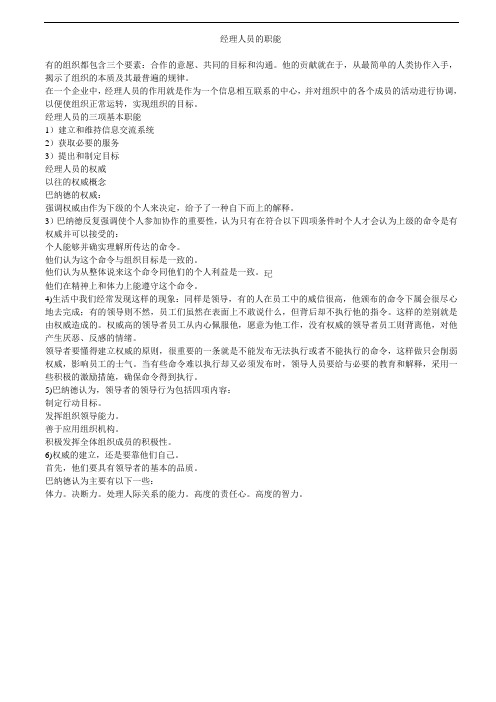
经理人员的职能有的组织都包含三个要素:合作的意愿、共同的目标和沟通。
他的贡献就在于,从最简单的人类协作入手,揭示了组织的本质及其最普遍的规律。
在一个企业中,经理人员的作用就是作为一个信息相互联系的中心,并对组织中的各个成员的活动进行协调,以便使组织正常运转,实现组织的目标。
经理人员的三项基本职能1)建立和维持信息交流系统2)获取必要的服务3)提出和制定目标经理人员的权威以往的权威概念巴纳德的权威:强调权威由作为下级的个人来决定,给予了一种自下而上的解释。
3)巴纳德反复强调使个人参加协作的重要性,认为只有在符合以下四项条件时个人才会认为上级的命令是有权威并可以接受的:个人能够并确实理解所传达的命令。
他们认为这个命令与组织目标是一致的。
他们认为从整体说来这个命令同他们的个人利益是一致。
他们在精神上和体力上能遵守这个命令。
4)生活中我们经常发现这样的现象:同样是领导,有的人在员工中的威信很高,他颁布的命令下属会很尽心地去完成;有的领导则不然,员工们虽然在表面上不敢说什么,但背后却不执行他的指令。
这样的差别就是由权威造成的。
权威高的领导者员工从内心佩服他,愿意为他工作,没有权威的领导者员工则背离他,对他产生厌恶、反感的情绪。
领导者要懂得建立权威的原则,很重要的一条就是不能发布无法执行或者不能执行的命令,这样做只会削弱权威,影响员工的士气。
当有些命令难以执行却又必须发布时,领导人员要给与必要的教育和解释,采用一些积极的激励措施,确保命令得到执行。
5)巴纳德认为,领导者的领导行为包括四项内容:制定行动目标。
发挥组织领导能力。
善于应用组织机构。
积极发挥全体组织成员的积极性。
6)权威的建立,还是要靠他们自己。
首先,他们要具有领导者的基本的品质。
巴纳德认为主要有以下一些:体力。
决断力。
处理人际关系的能力。
高度的责任心。
高度的智力。
经理人员的职能

经理人员的职能经典回顾(8 ):经理人员的职能社会系统学派(美)切斯特??I?? 巴纳德经理人员的职能本书的中心假设是,分析协作体系的经验的最有用的概念是下述定义:正式组织是有意识地协调两个以上的人的活动或力量的体系。
有些是物的体系,有些是生物的体系,有些是心理的体系,等等。
但把所有这些体系联结起来使之成为具体的协作整体的共同要素的,正是上述定义中所讲的组织。
如果说这个假说是能够令人满意的,那是由于:(二) 这样定义的组织只包含少量的变数,可以有效地进行研究,从而能够适应于广泛的具体情况;(2 )这个概念框架同其他体系的关系可以有效而实用地予以系统的阐述。
这个概念框架的最终考验是,它的应用是否能够更有效地处理和促进人们之间的协作。
也就是说,它在实际中是否能够提高有能力的人的预见能力。
本书展开的前提是,这一组织概念是内在于领导者和管理者的行为之中的,他们在各级不同的协作事业的行动中表现出来的一致性就表明了这点。
阐明和发展这一概念,就可以用共同的语言来表述不同领域中的经验。
当具备下列条件时,一个组织就成立了。
这些条件是:(1)能够互相进行信息交流的人们;(2 )这些人们愿意作出贡献;(3 )实现一个共同的目的。
因此,一个组织的要素是:(1)信息交流;(2 )作贡献的意愿;(3 )共同的目的。
这些要素是组织初成立时的必要条件和充分条件,并在所有的这类组织中都存在着。
第三个要素,共同的目的是在组织的定义中隐含着的。
作贡献的意愿和信息交流,这三个要素一般的相互依存,以及它们在具体协作系统中的相互依存,则是从经验和观察中得到的事实。
一个组织要持续存在,就必须既有有效性,又有能率;组织存在的时间越长,对这两者越是需要。
组织的活力在于其成员贡献力量的意愿。
这种意愿要求有共同目的能够实现的信念。
如果在进行过程中发现信念不能实现,这种信念就会降到零点。
这样,有效性就不存在,作贡献的意愿也就消失了。
作贡献意愿的持续还取决于成员个人在实现目的的过程中所获得的满足。
巴纳德《经理人员的职能》1.0

——巴纳德
企业管理专业 第3小组 November 2009
《经理人员的职能》分析大纲
1 作者背景
2 写作过程与时代背景 3 主要内容和基本观点 4 主要贡献与局限
2
作者背景
• 切斯特·巴纳德 (1886~1961)
【Chester Irving Barnard】
美国著名管理学家 近代管理理论奠基人之一 “现代管理理论之父” 社会系统学派创始人 代表作:《经理人员的职能》(1938)
2 正式组 织与复合 组织
3 维持组 织的有效 协作体系
4 经理人 员的职能
10
主要内容和基本观点(3)
3.个人与组织的关系 协作体系中个人之间的相互作用 个人和集体之间的相互作用
1 协作体 系的初步 考察
4.协作的产生和协作体系
(1)产生:
2 正式组 织与复合
个人目的的存在,或相信其存在,以及个人受 组织
• 正式组织产生后又创造出非正式组织并且需要非正式组织;
• 非正式组织两项职能:信息交流和调节人们的贡献意愿;
4 经理人 员的职能
13
主要内容和基本观点(6)
1.专门化
工作场所
工作时间
工作人员
工作对象
工作方法
1 协作体 系的初步 考察
2.组织的创造性来源于专业化革新:
(1)时间方面的专业化 ; (2)场所方面的专业化 ; (3)联系的专业化;
西方电气公司实验与 古典组织理论的冲突
时代背景
《经理人 员的职能》
帕雷托、L.J.享德森 社会学理论
科学技术的进步 生产力巨大发展 生产社会化程度的日益提高
6
写作过程与时代背景
- 1、下载文档前请自行甄别文档内容的完整性,平台不提供额外的编辑、内容补充、找答案等附加服务。
- 2、"仅部分预览"的文档,不可在线预览部分如存在完整性等问题,可反馈申请退款(可完整预览的文档不适用该条件!)。
- 3、如文档侵犯您的权益,请联系客服反馈,我们会尽快为您处理(人工客服工作时间:9:00-18:30)。
最近一段时间读了巴纳德的《经理人员的职能》,虽然文字有些晦涩难懂,但丝毫抵挡不住大师思想的魅力给我带来的震撼。
作为一名研究生,看书的目的已经不是获取通常意义上的知识——也即事实知识和原理知识,而是探求作者的思想是怎么产生的,作者是如何对一个问题进行深入剖析研究的,也即技能知识。
把大师深邃的思想归结为一种技能知识,似乎是对大师的一种贬低。
大师敏锐的洞察力和深入剖析问题的能力或许是不能用“技能”这个词来表述的。
在我的感觉中,只要具备一般以上的智力水平,技能知识都是能够学会的,而大师思考问题的角度和能力似乎只有很少数的人能够学会。
因此,看完一遍《经理人员的职能》来写这篇读后感,实感惴惴不安,我不知道我是否能够汲取大师思想的那么一两点精华,能否对大师的思想有一个正确的认识。
不过,既然读完一本书,就要有勇气把自己的想法拿出来让大家评判,这也算是对自己学习的一种交待。
巴纳德的组织理论已经为大多数学管理和从事管理工作的人所熟知,在此不作过多的叙述。
我想主要就自己比较有感触的几个点说一下自己的见解和感悟。
首先,作者在第一章导论部分说明了组织理论提出的重要意义和本书论述的大致框架。
其中作者说明了这么一点:在正式组织中,或由正式组织进行的成功的协作是非正常的,而不是正常的。
造成这种现象的的最根本的原因来自外界力量。
这些外界力量既为组织提供使用的物资,又限制了它的行动。
一个组织的持续取决于在不断变动的外界环境中,物的、生物的和社会的各种物质、要素和力量的复杂性之间维持平衡。
读完这句话,“物竞天择,适者生存”的理论即刻涌现在我的脑海里。
在某种意义上,企业就像一个生物,它能否继续生存,在很大程度上并不是取决于自己,而是取决于外界环境。
恐龙时代的结束便是由于外界环境变化的原因。
管理的本质便是维持组织与外界环境的一个平衡,但外界环境是变幻莫测的,管理不能保证组织与外界环境始终如一的平衡;需要保持平衡的因素是复杂多样的,我们也不可能面面俱到,尤其是对于那些我们还没有发现的因素。
当组织和外界环境之间的不平衡达到一定的程度,组织便告危亡,由此看来,管理的作用也是受到局限的,管理工作在一定程度上也是被动的。
因此,我们既不能忽视管理,也不能夸大管理的作用。
我们研究管理的目的便是让更多约束企业发展的因素曝光,进而将其转化为可以控制和管理的因素,降低企业与外部环境不平衡的不确定性,提高企业发展的安全性。
但正如自然科学的研究是无止境的,管理科学的研究也将是无止境的,我们永远不能肯定地说我们已经通过管理完全控制了公司的发展,完全保证了企业发展的安全性。
第二,作者在第二章论述了为了构建协作体系或组织理论,而提出的对人的行为的心理力的假设。
作者说明了这么几点:人是有选择能力的,但人同时又主要是现在和过去各种物的、生物的、社会的力量合成物;当我们把协作看成是两个以上的人的活动的一种职能体系时,讲的是人的职能的或过程的侧面。
而当我们把人看成是协作职能或过程的对象时,个人化这一方面就更为方便了;人们追求的特定目的有两种:物的和社会的。
作者这一对人性假设的提出我是十分赞同的。
分析一个人的心理和行动,首先要分析他的价值观,即他存在的价值是什么,他生命的追求是什么。
不同的人价值观有所不同,但对物的和社会的目的的追求,却是普遍存在于每一个人身上的。
巴纳德从形形色色的人中总结归纳出人的共性,这首先要归功于他多年参与管理实践的经验,同时这与他高度的归纳概括能力是密不可分的。
在分析了人们基本的价值观后,巴纳德把“组织中的个人”和“作为个人的个人”进行了区分,组织中的个人是人的职能的或过程的侧面,可以说组织中的人隐藏了他的一部分个性,导致了他在组织中的所作所为与其个人行为是不同的。
当我们主要考察组织作为一个整体的运行时,我们可以忽略每个人的个性,仅仅关注每个人作为所承担的职能的一面,这就省去了许多复杂的因素,而当把人看成是协作职能或过程的对象时,我们就要注意到个人化。
比如在进行员工的薪酬和奖酬设计时,我们就要充分的考虑到员工的个人化需求,对于不同的人也要采取不同的措施。
巴纳德的这种善于切割问题的能力是我们要学习的,他没有一概而论应该如何去对人做假设,而是将不同情境下的人进行细化,不同情境下的人具有不同的特征,以此为假设所提出的理论才会更为接近现实,才能得到人们的认可。
如果一个理论所依据的假设是粗糙的,是不能令人信服的,那么即使他后面的论证过程再严密,也将是无用的理论。
管理学作为一门应用性的学科,更应注重对问题的基本假设。
当然,每一种理论所依据的假设必定是从某一个或几个角度来说明问题,因此也不可避免的是片面的,各种管理流派的产生也是源于对问题的不同假设,但我们只要在所涉及的角度上做到令人信服也就足以了。
如果把做研究比作盲人摸象,我们摸到象的腿就说大象像柱子是没有错的,错的是摸到象的腿而说它是一面墙。
换句话说也就是,作研究不怕所阐述的观点是片面的,怕的是连这一点片面都没有正确的认识,无数的片面连接起来会让我们对事实的真相和全貌有一个正确的认识,而错误的片面认识无论怎么组合也不会发现事物的真相。
第三、巴纳德在第三、四两章中对协作体系中的物的因素、生物的因素、人的因素和社会的因素作了深刻透彻的剖析说明。
并在第五章指出只有这四个因素全部具备才能构成一个协作体系。
在第五章中,有这么几个观点引起了我的兴趣。
首先是协作的过程就是努力克服这几种因素所带来的限制的过程。
那么协作中管理的作用或许就是一个克服限制的过程。
可以说这是对管理的一个本质的理解。
第二、除了克服几种因素所带来的限制,维持协作也是协作的目的之一。
这一点就指明了我们在组织中所作的一些事情或许对于绩效没有太多作用,但对于协作的继续存在是必不可少的,这些事情也将是有意义的。
企业文化的培养或许就是这样的事情。
我们的企业不仅要解决发展的问题,还要保证企业寿命的延续,这就关系到企业做大做强和做久的问题,成功的企业应该是两者兼具的。
第三、作者强调了组织理论的几个基本假设。
其中协作的持续的两个条件的提出是很有价值的,这两个条件就是我们通常所说的协作的有效性和能率性。
协作不仅要有效,还必须有能率,有效性指的是组织共同目的的实现,而能率性则指的是能诱发出足够的个人参加协作的意愿,对于一个组织来说这两者是缺一不可的。
这一假设为以后的展开论述作好了铺垫。
第四、在正式组织理论的一章中,有这么两段话让我颇有感触。
第一段是:“只有当协作的参加者没有认识到他们对协作目的的理解存在严重分歧的时候,组织的这个目的才能成为协作体系的一个组成要素。
如果客观的观察到的目的同从协作角度观察到的目的之间存在重要的差异,当目的是具体的、有形的、物的目的时,这种差异很快就会显露出来;而当目的是一般性的、无形的、感情性的目的时,差异可能很大却没有被人们认识到。
因此,能够作为协作体系基础的客观目的是贡献者相信为已决定的组织的目的。
反复灌输存在着共同目的的信念是经理人员的一种主要职能。
”这段话充分说明了组织的愿景和组织文化的重要性。
参加组织的个人其目的是不尽相同的,有的人可能追逐金钱,有的人追逐地位,有的人追逐自己的兴趣。
如果人们都充分的认识到每个人追求的差异,就会产生排斥心理,“道不同不相为谋”,不会产生凝聚力。
企业的愿景和文化的目的就是让人们寻求到在组织中的共同点,产生共振,进而产生凝聚力。
但企业仅有愿景是不够的,还要把愿景进行细化,分解成一个一个的短期目标,一步步地去实现。
每个短期目标能否实现直接关系到人们的凝聚力是否能够持续下去,而如果目标很容易就会实现又不会激发人们的干劲,因此目标的设立也是一门艺术《经理人员的职能》切斯特●巴纳德(上)管理学一般知识[ 2010-01-24 00:20:12 阅读109 评论0 字号:大中小订阅《经理人员的职能》切斯特●巴纳德【作者简介】切斯特●巴纳德,社会系统学派的创始人,1886年生于马萨诸塞州,1906-1909年,巴纳德靠勤工俭学读完了哈佛大学的经济学课程,然而由于缺少实践没有得到学位。
后来他因在研究组织和管理性质,以及理论方面做出的杰出贡献,而获得了7个名誉博士学位。
巴纳德在美国的AT和T公司的职业生涯中,前10年担任参谋人员,以后长期担任直线人员的领导职务,这两方面的经验对他以后创立社会系统学派的理论提供了很大的帮助。
在漫长的工作实践中,巴纳德积累了丰富的企业管理经营经验,写了许多重要著作。
巴纳德的主要贡献是建立发展现代管理科学,其代表作主要有:1938年出版的《经理人员的职能》和《组织与管理》。
其中《经理人员的职能》一书被誉为美国现代管理科学的经典性著作。
【内容提要】在《经理人员的职能》一书中,巴纳德认为,经理人员在组织中的作用,就是在信息沟通系统中作为相互联系的中心,并通过信息沟通来协调组织成员的协作活动,以保证组织的正常运转,实现组织的共同目标。
他认为,作为正式组织的协作系统,不论其规模大小或级别高低,都包含了协作意愿、共同目标、信息交流等三个基本要素。
巴纳德指出,经理人员作为企业组织的领导核心,必须具有权威。
领导人的素质1.领导人需具备的条件巴纳德认为,要成为一个领导者就必须具备一定的条件,但条件也是因时因事因地而异的。
在本书中只谈了二种情况下领导人应该具备的条件:(1)平时在平时,对领导的要求是冷静、审填、深思熟虑、瞻前顾后。
在平时条件下,领导人应付紧急情况的能力和品质是看不见的,这是一个难题。
(2)关键时刻关键时该,也就是紧急关头,指是发生重大危机。
前途未卜、生命存亡之际,情况瞬息万变,要求当机立断。
这不仅要求领导人有极大的勇气,富于独创的精神,甚至还需要厚颜无耻、卑躬屈膝。
任何组织的行动,总会遇到这种或那种紧急情况,这就要求具有适应不同环境的广泛应变能力。
领导者必须具备有极大的韧性和弹性,刚柔兼备,才能运用自如。
2、领导人具备的品质巴纳德认为,环境和组织对领导人影响极大,但领导人的个人品质毕竟是决定性的。
他提出,作为领导人必须具备以下基本品质:(1)活力和忍耐力这是领导人应具备的基本品质。
活力和忍耐力并不一定就是身体健康,要成为领导人,就必须具备活力和忍耐力,因为:这种品质有助于获得难能可贵的经验和知识。
活力是产生个人魅力不可缺少的因素。
领导人有时需要长时间地连续工作,经历紧张的时刻。
缺少活力和忍耐力将意味着工作中断。
(2)能当机立断做出决定的能力是构成领导人品质的重要因素。
巴纳德认为,决断并不是随便使用权威或滥用权力。
他认为,领导需要及时作出正确的决断,犹豫不决就会丧失时机,一环失灵就会影响更重要的决策过程,使整个组织的行动归于失败。
(3)能理解他人巴纳德认为,要说服他人首先要有理解他人的本事。
这包括理解别人的思想观点,设身处地考虑别人的利益和有关情况。
